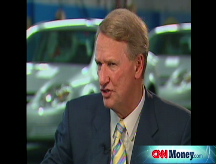 BOULDER, Colorado -- Much has been made in international development circles of the idea of "leapfrog" technology - that is, countries can skip over earlier generations of a particular technology and immediately adopt the latest and greatest, thus avoiding the costs of building outdated infrastructure that will inevitably have to be replaced.
BOULDER, Colorado -- Much has been made in international development circles of the idea of "leapfrog" technology - that is, countries can skip over earlier generations of a particular technology and immediately adopt the latest and greatest, thus avoiding the costs of building outdated infrastructure that will inevitably have to be replaced.This idea has been illustrated most effectively in the telephone business. Many third world countries have chosen to forgo building a land-line system, with miles and miles of costly copper wire and thousands of switchboards; instead, they have gone straight to mobile phones. The infrastructure is cheaper, and it can be easily erected in the most remote locations. Mobile phones are also cheap to own, and they allow the world's poor to gain access to many other important services, like banking, without the need for a fixed, legal address.
But is the model applicable to other technologies? Oft-touted efforts to distribute laptops to the poor have been dismal failures, and poorer countries invariably opt to build older, dirtier power plants instead of adopting expensive, cutting-edge green technologies.
As the Economist reports, the leapfrog phenomenon may be quite unique. Thanks to increased global flows of trade, capital, and people, advanced technologies are easily spread across the world. According to a World Bank study, in industrialized countries, once a technology - items like cell phones or PCs - is adopted, it takes only a short time to reach a market penetration of 25%-50%. In emerging markets, the Bank found penetration rarely broke the 5% barrier, meaning poorer countries can get access to the technology, but rarely can they put it into broad use. This is largely due to the fact that these countries have high levels of income inequality, meaning this technology rarely makes its way from the urban elites to the rural poor.
I should add that there is a great deal of variation across countries and with different technologies, but the basic point stands - it is overly optimistic to think that leapfrogging can happen everywhere with everything, as the evidence for it remains largely anecdotal.
Which brings us to an interesting example related to cars. In the past, poorer countries adopted older technology first when it came to cars. Car makers took their older models and exported them or manufactured them in emerging markets where safety and pollution standards were lower - think of the VW Beetle in Latin America. These countries also had large markets for second-hand cars from the rich world - think of all the right-hand drive Japanese cars in Russia - and these two sources made up the bulk of their fleets.
But rich world car makers don't operate that way any more. They are making more cars specifically designed for emerging markets, and they are introducing cleaner technologies as the cost of producing these higher-tech cars falls, the price of oil remains high (believe me - it will be going up again soon), and concerns about pollution and climate change become more widespread. Nissan-Renault has made grandiose statements that all car makers must aim to make their fleets zero-emissions, GM is hoping its plug-in Chevy Volt will beat out hybrid technology and become a big seller worldwide, and even local manufacturers in China and India are poised to launch alternative fuel vehicles.

So, this is where the leapfrogging comes in. Most developing countries, including places like China and India, do not have the infrastructure to support mass automobile ownership - things like gas stations, auto parts stores and mechanics. What this means is that electric or alternative fuel vehicles are not at an immediate disadvantage when breaking into the market; the infrastructure to support them can be built as they gain popularity, and it won't have to compete with gasoline filling stations, because they are not there. In the US, for example, the lack of these alternative resources - as well as the lack of an adequate power grid to support the widespread ownership of electric cars - can dissuade buyers and has allowed gasoline-powered hybrids to be the become the preeminent lower-emissions vehicle technology.
So, the potential is there for cleaner cars to fill the roads of the developing world as the global automobile fleet swells - it is slated to reach 2.9 billion cars by 2050, up from 600 million in 2005. The mighty automobile may join the modest cell phone among technologies that have successfully made the leap.
[Photos: Brazil's first car, the three-wheeled Romi; the Chevy Volt]













